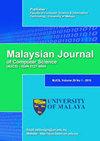IMPROVING MULTI-LABEL TEXT CLASSIFICATION USING WEIGHTED INFORMATION GAIN AND CO-TRAINED MULTINOMIAL NAÏVE BAYES CLASSIFIER
IF 1.2
4区 计算机科学
Q4 COMPUTER SCIENCE, ARTIFICIAL INTELLIGENCE
引用次数: 3
Abstract
Over recent years, the emergence of electronic text processing systems has generated a vast amount of structured and unstructured data, thus creating a challenging situation for users to rummage through irrelevant information. Therefore, studies are continually looking to improve the classification process to produce more accurate results that would benefit users. This paper looks into the weighted information gain method that re-assigns wrongly classified features with new weights to provide better classification. The method focuses on the weights of the frequency bins, assuming every time a certain word frequency bin is iterated, it provides information on the target word feature. Therefore, the more iteration and re-assigning of weight occur within the bin, the more important the bin becomes, eventually providing better classification. The proposed algorithm was trained and tested using a corpus extracted from dedicated Facebook pages related to diabetes. The weighted information gain feature selection technique is then fed into a co-trained Multinomial Naïve Bayes classification algorithm that captures the labels' dependencies. The algorithm incorporates class value dependencies since the dataset used multi-label data before converting string vectors that allow the sparse distribution between features to be minimised, thus producing more accurate results. The results of this study show an improvement in classification to 61%.利用加权信息增益和联合训练的多项式NA-VE-BAYES分类器改进多标签文本分类
近年来,电子文本处理系统的出现产生了大量的结构化和非结构化数据,从而给用户在不相关的信息中翻找带来了挑战。因此,研究一直在寻求改进分类过程,以产生更准确的结果,从而使用户受益。本文研究了加权信息增益方法,用新的权重重新分配错误分类的特征,以提供更好的分类。该方法关注频率箱的权值,假设每次迭代某个词频率箱时,它提供了目标词特征的信息。因此,在bin中迭代和重新分配权重的次数越多,bin就越重要,最终提供更好的分类。所提出的算法使用从与糖尿病相关的专用Facebook页面中提取的语料库进行训练和测试。然后将加权信息增益特征选择技术馈送到共同训练的多项式Naïve贝叶斯分类算法中,该算法捕获标签的依赖关系。该算法结合了类值依赖关系,因为数据集在转换字符串向量之前使用了多标签数据,从而使特征之间的稀疏分布最小化,从而产生更准确的结果。这项研究的结果表明,分类提高到61%。
本文章由计算机程序翻译,如有差异,请以英文原文为准。
求助全文
约1分钟内获得全文
求助全文
来源期刊

Malaysian Journal of Computer Science
COMPUTER SCIENCE, ARTIFICIAL INTELLIGENCE-COMPUTER SCIENCE, THEORY & METHODS
CiteScore
2.20
自引率
33.30%
发文量
35
审稿时长
7.5 months
期刊介绍:
The Malaysian Journal of Computer Science (ISSN 0127-9084) is published four times a year in January, April, July and October by the Faculty of Computer Science and Information Technology, University of Malaya, since 1985. Over the years, the journal has gained popularity and the number of paper submissions has increased steadily. The rigorous reviews from the referees have helped in ensuring that the high standard of the journal is maintained. The objectives are to promote exchange of information and knowledge in research work, new inventions/developments of Computer Science and on the use of Information Technology towards the structuring of an information-rich society and to assist the academic staff from local and foreign universities, business and industrial sectors, government departments and academic institutions on publishing research results and studies in Computer Science and Information Technology through a scholarly publication. The journal is being indexed and abstracted by Clarivate Analytics'' Web of Science and Elsevier''s Scopus
 求助内容:
求助内容: 应助结果提醒方式:
应助结果提醒方式:


